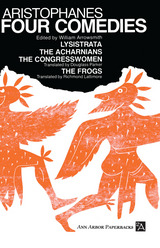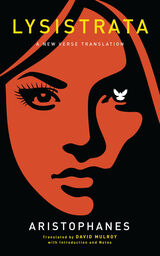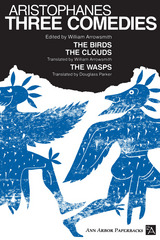
The master of Old Comedy.
Aristophanes of Athens, one of the world’s greatest comic dramatists, has been admired since antiquity for his iridescent wit and beguiling fantasy, exuberant language, and brilliant satire of the social, intellectual, and political life of Athens at its height. The Loeb Classical Library edition of his plays is in four volumes.
The Introduction to the edition is in Volume I. Also in the first volume is Acharnians, in which a small landowner, tired of the Peloponnesian War, magically arranges a personal peace treaty; and Knights, perhaps the most biting satire of a political figure (Cleon) ever written.
Three plays are in Volume II. Socrates’ “Thinkery” is at the center of Clouds, which spoofs untraditional techniques for educating young men. Wasps satirizes Athenian enthusiasm for jury service. In Peace, a rollicking attack on war-makers, the hero travels to heaven on a dung beetle to discuss the issues with Zeus.
The enterprising protagonists of Birds create a utopian counter-Athens ruled by birds. Also in Volume III is Lysistrata, in which our first comic heroine organizes a conjugal strike of young wives until their husbands end the war between Athens and Sparta. Women again take center stage in Women at the Thesmophoria, this time to punish Euripides for portraying them as wicked.
Frogs, in Volume IV, features a contest between the traditional Aeschylus and the modern Euripides, yielding both sparkling comedy and insight on ancient literary taste. In Assemblywomen Athenian women plot to save Athens from male misgovernance—with raucously comical results. Here too is Wealth, whose gentle humor and straightforward morality made it the most popular of Aristophanes’ plays from classical times to the Renaissance.

The master of Old Comedy.
Aristophanes of Athens, one of the world’s greatest comic dramatists, has been admired since antiquity for his iridescent wit and beguiling fantasy, exuberant language, and brilliant satire of the social, intellectual, and political life of Athens at its height. The Loeb Classical Library edition of his plays is in four volumes.
The Introduction to the edition is in Volume I. Also in the first volume is Acharnians, in which a small landowner, tired of the Peloponnesian War, magically arranges a personal peace treaty; and Knights, perhaps the most biting satire of a political figure (Cleon) ever written.
Three plays are in Volume II. Socrates’ “Thinkery” is at the center of Clouds, which spoofs untraditional techniques for educating young men. Wasps satirizes Athenian enthusiasm for jury service. In Peace, a rollicking attack on war-makers, the hero travels to heaven on a dung beetle to discuss the issues with Zeus.
The enterprising protagonists of Birds create a utopian counter-Athens ruled by birds. Also in Volume III is Lysistrata, in which our first comic heroine organizes a conjugal strike of young wives until their husbands end the war between Athens and Sparta. Women again take center stage in Women at the Thesmophoria, this time to punish Euripides for portraying them as wicked.
Frogs, in Volume IV, features a contest between the traditional Aeschylus and the modern Euripides, yielding both sparkling comedy and insight on ancient literary taste. In Assemblywomen Athenian women plot to save Athens from male misgovernance—with raucously comical results. Here too is Wealth, whose gentle humor and straightforward morality made it the most popular of Aristophanes’ plays from classical times to the Renaissance.

The master of Old Comedy.
Aristophanes of Athens, one of the world’s greatest comic dramatists, has been admired since antiquity for his iridescent wit and beguiling fantasy, exuberant language, and brilliant satire of the social, intellectual, and political life of Athens at its height. The Loeb Classical Library edition of his plays is in four volumes.
The Introduction to the edition is in Volume I. Also in the first volume is Acharnians, in which a small landowner, tired of the Peloponnesian War, magically arranges a personal peace treaty; and Knights, perhaps the most biting satire of a political figure (Cleon) ever written.
Three plays are in Volume II. Socrates’ “Thinkery” is at the center of Clouds, which spoofs untraditional techniques for educating young men. Wasps satirizes Athenian enthusiasm for jury service. In Peace, a rollicking attack on war-makers, the hero travels to heaven on a dung beetle to discuss the issues with Zeus.
The enterprising protagonists of Birds create a utopian counter-Athens ruled by birds. Also in Volume III is Lysistrata, in which our first comic heroine organizes a conjugal strike of young wives until their husbands end the war between Athens and Sparta. Women again take center stage in Women at the Thesmophoria, this time to punish Euripides for portraying them as wicked.
Frogs, in Volume IV, features a contest between the traditional Aeschylus and the modern Euripides, yielding both sparkling comedy and insight on ancient literary taste. In Assemblywomen Athenian women plot to save Athens from male misgovernance—with raucously comical results. Here too is Wealth, whose gentle humor and straightforward morality made it the most popular of Aristophanes’ plays from classical times to the Renaissance.


The master of Old Comedy.
The eleven plays by Aristophanes that have come down to us intact brilliantly illuminate the eventful period spanned by his forty-year career, beginning with the first production in 427 BC. But the Athenians knew much more of his work: over forty plays by Aristophanes were read in antiquity, of which nearly a thousand fragments survive. These provide a fuller picture of the poet’s ever astonishing comic vitality and a wealth of information and insights about his world. Jeffrey Henderson’s new, widely acclaimed Loeb edition of Aristophanes is completed by this volume containing what survives from, and about, his lost plays, hitherto inaccessible to the nonspecialist, and incorporating the enormous scholarly advances that have been achieved in recent years.
Each fragmentary play is prefaced by a summary of what can be inferred about its plot, characters, themes, theatricality, and topical significance. Also included in this edition are the ancient reports about Aristophanes’ life, works, and influence on the later comic tradition.

The master of Old Comedy.
Aristophanes of Athens, one of the world’s greatest comic dramatists, has been admired since antiquity for his iridescent wit and beguiling fantasy, exuberant language, and brilliant satire of the social, intellectual, and political life of Athens at its height. The Loeb Classical Library edition of his plays is in four volumes.
The Introduction to the edition is in Volume I. Also in the first volume is Acharnians, in which a small landowner, tired of the Peloponnesian War, magically arranges a personal peace treaty; and Knights, perhaps the most biting satire of a political figure (Cleon) ever written.
Three plays are in Volume II. Socrates’ “Thinkery” is at the center of Clouds, which spoofs untraditional techniques for educating young men. Wasps satirizes Athenian enthusiasm for jury service. In Peace, a rollicking attack on war-makers, the hero travels to heaven on a dung beetle to discuss the issues with Zeus.
The enterprising protagonists of Birds create a utopian counter-Athens ruled by birds. Also in Volume III is Lysistrata, in which our first comic heroine organizes a conjugal strike of young wives until their husbands end the war between Athens and Sparta. Women again take center stage in Women at the Thesmophoria, this time to punish Euripides for portraying them as wicked.
Frogs, in Volume IV, features a contest between the traditional Aeschylus and the modern Euripides, yielding both sparkling comedy and insight on ancient literary taste. In Assemblywomen Athenian women plot to save Athens from male misgovernance—with raucously comical results. Here too is Wealth, whose gentle humor and straightforward morality made it the most popular of Aristophanes’ plays from classical times to the Renaissance.

A perennial classroom and stage favorite as well as the basis of Spike Lee’s Chi-Raq, the play is as relevant today as it was 2,500 years ago. The premise is simplicity itself: to end the Peloponnesian War, women decide to withhold sex from their husbands until the fighting stops.
The play is by turns raucous, bawdy, frantic, and funny. David Mulroy’s exciting new translation retains the original’s verse format, racy jokes, and vibrancy—setting it apart from previous efforts, which are typically reproduced as prose or depart from meaning and meter. His introduction offers a concise summary of Aristophanes’ life and social milieu, including a brief overview of the Peloponnesian War, which took place during the playwright’s lifetime. The appendices include guides on translating meter and Greek pronunciation for aspiring thespians.


READERS
Browse our collection.
PUBLISHERS
See BiblioVault's publisher services.
STUDENT SERVICES
Files for college accessibility offices.
UChicago Accessibility Resources
home | accessibility | search | about | contact us
BiblioVault ® 2001 - 2024
The University of Chicago Press









